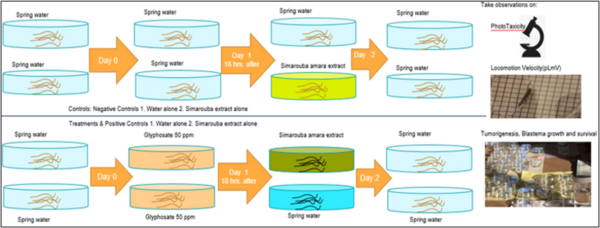Testing Simarouba amara’s therapeutic effects against weedicide-induced tumor-like morphology in planarians
(1) 1Westwood High School, (2) US Department of Veterans Affairs
https://doi.org/10.59720/23-174
According to the World Health Organization, cancer is a leading cause of death globally. The disease’s prevalence is rapidly increasing in association with factors including the increased use of pesticides and herbicides, such as glyphosate, which is one of the most widely used herbicide ingredients. Although chemotherapy is currently the most common option for treatment, its high cost and rates of side effects make it less accessible to economically disadvantaged patients. Natural antioxidants and phytochemicals are being tested as anti-cancer agents due to their antiproliferative, antioxidative, and pro-apoptotic properties. Simarouba amara is one such plant and contains several alkaloid derivatives known to inhibit cancerous growth. Thus, we aimed to investigate the potential role of S. amara extract as a therapeutic agent against glyphosate-induced toxicity and tumor-like morphologies in regenerating and homeostatic planaria (Dugesia dorotocephala). We hypothesized that S. amara would reduce and prevent tumor-like lesions and toxicity in planarians exposed to glyphosate. We conducted several assays to determine the efficacy of Simarouba extract in reducing tumor-like lesions and morphological changes, increasing survival rate, mitigating blastema reduction, and maintaining locomotive velocity in glyphosate-exposed planarians. In three sets of trials, planarians treated with S. amara extract after glyphosate-induced toxicity showed higher negative phototaxicity compared to those treated with spring water after glyphosate exposure. S. amara also significantly increased the survival rate, subdued tumor-like lesions, and mitigated blastema reduction in glyphosate-exposed planarians compared to those treated with spring water. The results show that S. amara extract possesses therapeutic effects against weedicide-induced toxicity.
This article has been tagged with: